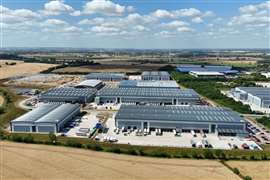Bulgarian construction slows
01 April 2009

The construction market in Bulgaria will slow during 2009 as the effects of reduced foreign capital investment, limitations on mortgage lending, the global economic slowdown and a weaker economic climate among construction companies take hold.
A report from PMR market research entitled ‘The construction market in Bulgaria 2009. Development forecasts for 2009 to 2011' also said that while there will be a slight growth in civil engineering through the year, this growth will fail to counter the decline in residential and non-residential construction.
According to the report, GDP growth in Bulgaria is expected to slow visibly in the coming years with a slight reduction ‘very' likely in 2009.
"After impressive growth in the country between 2005 and 2007, in the second half of 2008 the construction market started to level off, and in 2009 it's expected to shrink," said report author Bartlomiej Sosna, a senior construction analyst at PMR.
"In the last quarter of 2008 and the first quarter of 2009 the economic climate in construction returned to the level seen between 2002 and 2004, a period of minor growth," said Mr Sosna. "The liquidity of construction companies is very low and barter payments are becoming increasingly common."
Particularly hard hit is the residential and non-residential sector, which has already seen the withdrawal of many external investors. "At present, many projects at the point of negotiation with contractors have been brought to a halt," said Mr Sosna. "Furthermore, investors in apartments and residential areas have been delaying their payments to contractors."
According to the report, the number of mortgages approved by banks in Bulgaria is falling by -80% per annum and banks are only offering mortgages of up to 70% of a property's value.
In the non-residential sector, the largest projects which were due to have started this year have been postponed until an improvement is seen according to the report.
"Of 20 malls and shopping centres planned for Sofia, fewer than half have a realistic chance of being built," said Mr Sosna. "And even these are not very likely to begin in 2009. The two largest projects in the non-residential arena, worth € 700 million, have been cancelled and this will definitely have an adverse effect on the market."
At the beginning of 2008 it was estimated that more than 800000 m2 of new office space would be opened by the end of 2010. Currently, the total area under construction is just 230000 m2. "There are very few projects being built at the moment and interestingly, there's a trend towards re-renting office space with the sole purpose of cutting costs," said Mr Sosna.
"The very limited experience of the Bulgarian government with regards the prompt spending of EU funds means that civil engineering projects, of which single figure growth rates are possible, will not redress the decline in residential and non-residential construction," said Mr Sosna.
"It is probable that 2010 will be worse than 2009 because at least in 2009 construction companies will be completing projects started in 2007 and 2008."



